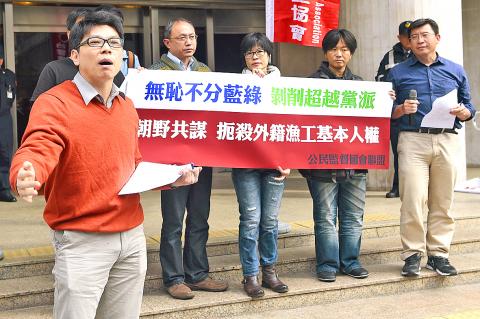Citizen’s Congress Watch yesterday lashed out the legislature for the passage of an amendment to the Fisheries Act (漁業法) that relieved employers of foreign fishermen of the obligation to pay for employees’ health insurance premiums dating back to 2009, while opposition lawmakers expressed concern that the amendment heralded a possible exclusion of the workers from the mandatory insurance system.
Late on Thursday night, one day before the legislative session ended, the legislature approved the controversial amendment without objection, despite concerns voiced by several civil groups led by Citizen’s Congress Watch earlier this week over alleged violations of international covenants on human rights.
The amendment to Article 69-2 waived debts employers of migrant marine workers should have paid for the workers’ coverage under the National Health Insurance (NHI) from 2009 until the passage of the amendment.

Photo: Chen Chih-chu, Taipei Times
The change was proposed by Chinese Nationalist Party (KMT) legislators Su Ching-chuan (蘇清泉) and Huang Chao-hsun (黃昭順). It garnered more than a dozen KMT lawmakers’ signatures and was endorsed by all parties.
The proposal was put forward because “foreign fishermen have long been insured by their employers under commercial insurance schemes rather than through the NHI and foreign fishermen paid out of their own pockets instead of using the NHI system when seeking medical help,” its initiators said.
The NHI administration’s demand for unpaid premiums “has unreasonably made foreign fishermen shoulder the fees while not benefiting from the state-run system,” they said.
Citizen’s Congress Watch said that the reasons given for waiving employers’ responsibility to pay the premiums were not legitimate.
“Su’s proposal legitimized what had been illegal,” the group said.
Democratic Progressive Party (DPP) Legislator Lin Shu-fen (林淑芬) said the passage of the amendment was “shameful exploitation of a vulnerable group.”
Lin said it was “a symbolic crack” in the current system, which would mean that even though the law requires employers to insure foreign fishermen through the NHI, they could stop paying the premiums, as “lawmakers will someday write the debts off.”
Some DPP lawmakers proposed making other changes to the article, including one that would have exempted foreign fishermen from the nation’s labor insurance system if their employers had them covered by a commercial insurance firm, and one that would exclude the workers from the mandatory NHI system. The other amendments were withheld at the session.
Although the DPP’s proposals were not passed, Lin said she knew that their backers would resubmit them.
“A group of vulnerable fishermen fight the ocean for Taiwanese and we are going to deprive them of their rights,” Lin said.
“Is it sensible for the DPP, which has even agreed to have Chinese students who study in Taiwan insured with the NHI, to deprive foreign fishermen of the same right, especially when they risk their lives at their job?” she asked.
Additional reporting by Shih Hsiu-chuan

CHAOS: Iranians took to the streets playing celebratory music after reports of Khamenei’s death on Saturday, while mourners also gathered in Tehran yesterday Iranian Supreme Leader Ayatollah Ali Khamenei was killed in a major attack on Iran launched by Israel and the US, throwing the future of the Islamic republic into doubt and raising the risk of regional instability. Iranian state television and the state-run IRNA news agency announced the 86-year-old’s death early yesterday. US President Donald Trump said it gave Iranians their “greatest chance” to “take back” their country. The announcements came after a joint US and Israeli aerial bombardment that targeted Iranian military and governmental sites. Trump said the “heavy and pinpoint bombing” would continue through the week or as long

TRUST: The KMT said it respected the US’ timing and considerations, and hoped it would continue to honor its commitments to helping Taiwan bolster its defenses and deterrence US President Donald Trump is delaying a multibillion-dollar arms sale to Taiwan to ensure his visit to Beijing is successful, a New York Times report said. The weapons sales package has stalled in the US Department of State, the report said, citing US officials it did not identify. The White House has told agencies not to push forward ahead of Trump’s meeting with Chinese President Xi Jinping (習近平), it said. The two last month held a phone call to discuss trade and geopolitical flashpoints ahead of the summit. Xi raised the Taiwan issue and urged the US to handle arms sales to

BIG SPENDERS: Foreign investors bought the most Taiwan equities since 2005, signaling confidence that an AI boom would continue to benefit chipmakers Taiwan Semiconductor Manufacturing Co’s (TSMC, 台積電) market capitalization swelled to US$2 trillion for the first time following a 4.25 percent rally in its American depositary receipts (ADR) overnight, putting the world’s biggest contract chipmaker sixth on the list of the world’s biggest companies by market capitalization, just behind Amazon.com Inc. The site CompaniesMarketcap.com ranked TSMC ahead of Saudi Aramco and Meta Platforms Inc. The Taiwanese company’s ADRs on Tuesday surged to US$385.75 on the New York Stock Exchange, as strong demand for artificial intelligence (AI) applications led to chip supply constraints and boost revenue growth to record-breaking levels. Each TSMC ADR represents

State-run CPC Corp, Taiwan (CPC, 台灣中油) yesterday said that it had confirmed on Saturday night with its liquefied natural gas (LNG) and crude oil suppliers that shipments are proceeding as scheduled and that domestic supplies remain unaffected. The CPC yesterday announced the gasoline and diesel prices will rise by NT$0.2 and NT$0.4 per liter, respectively, starting Monday, citing Middle East tensions and blizzards in the eastern United States. CPC also iterated it has been reducing the proportion of crude oil imports from the Middle East and diversifying its supply sources in the past few years in response to geopolitical risks, expanding